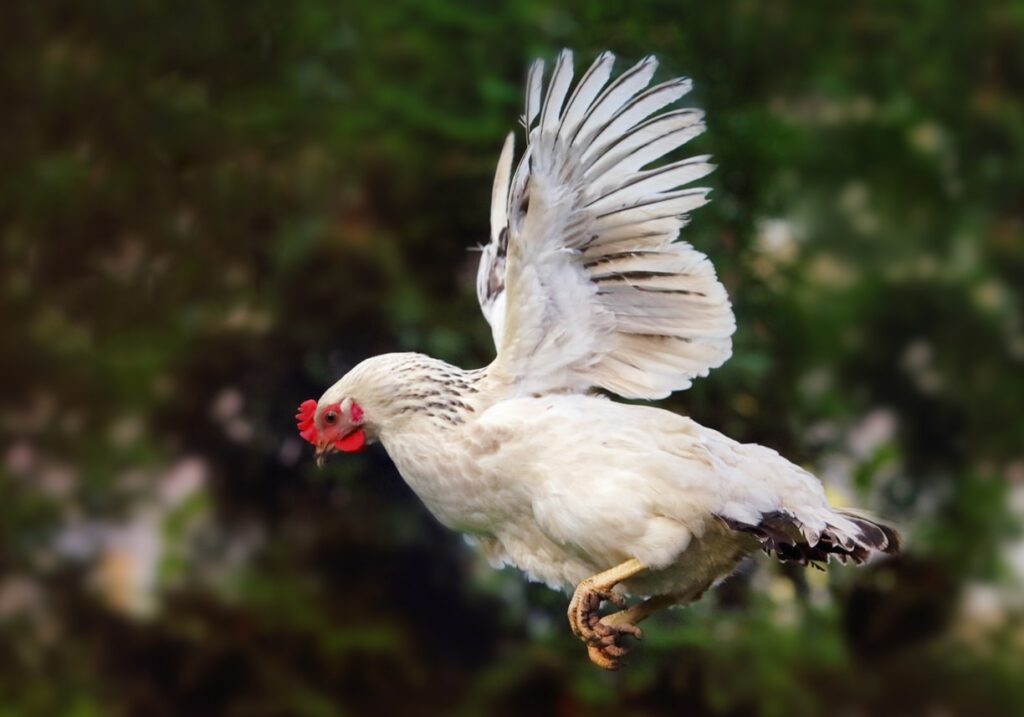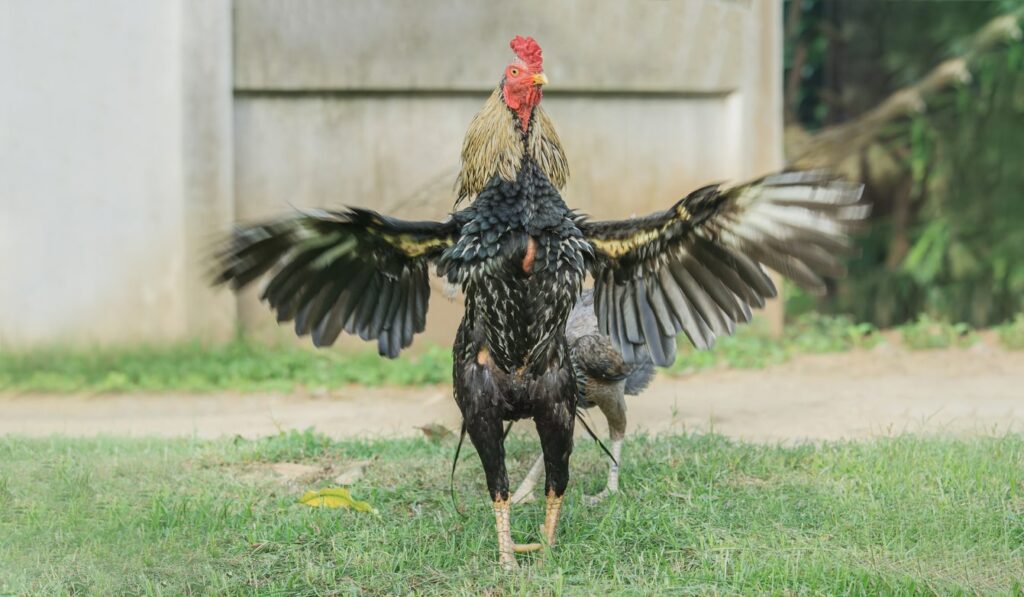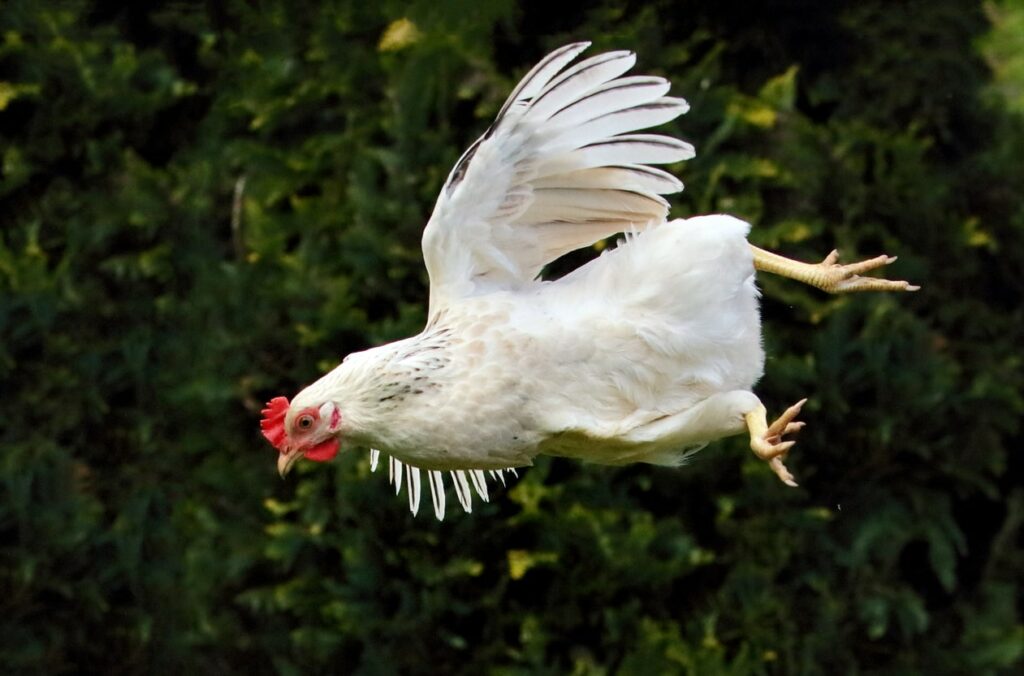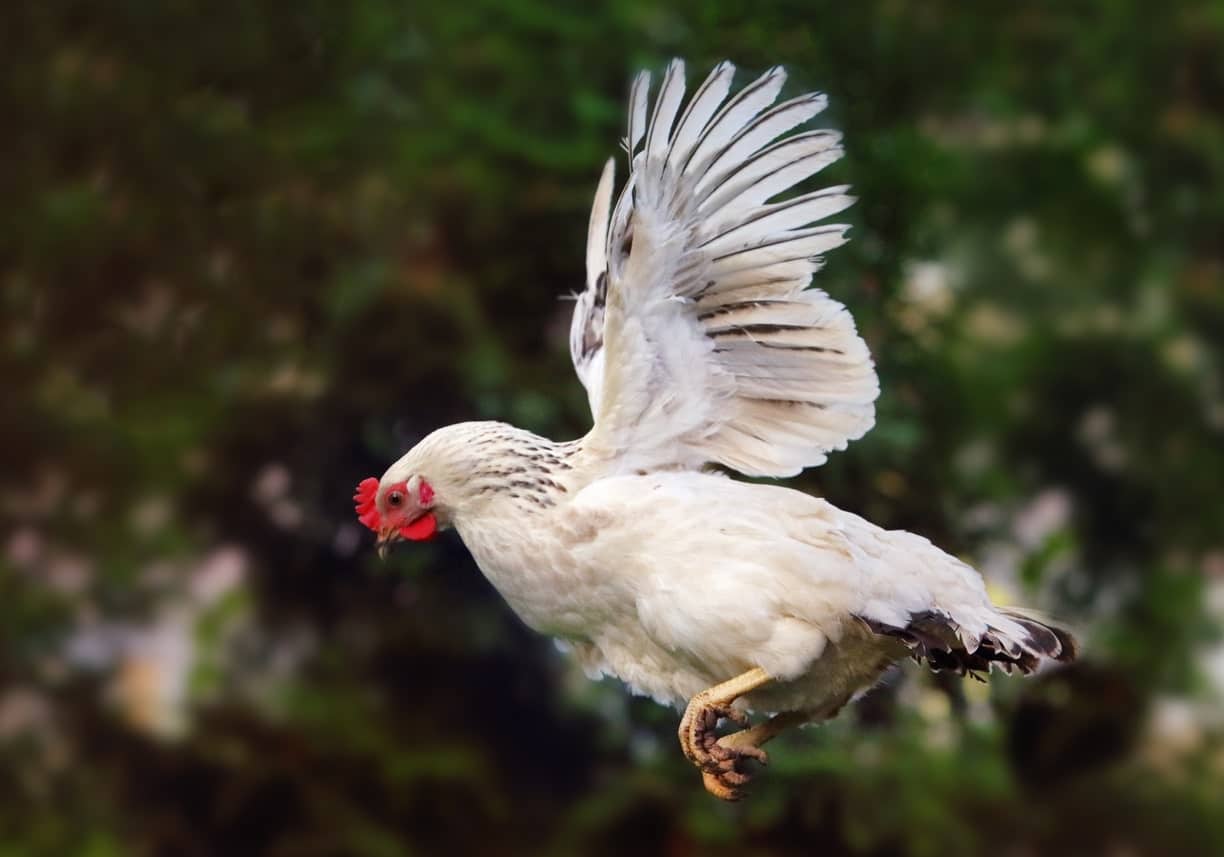Can chickens fly? What about roosters? Most people assume chickens never leave the ground, but they have large, feathery wings like most birds. So, it’s common to wonder what those wings are used for.
Let’s take a look at chicken behaviors and history to see whether or not chickens and roosters can fly like other birds.
[toc]
Can Chickens Fly?

Yes, chickens can fly, but it’s rare. When they do fly, they only make it short distances before coming back to the ground.
You won’t see a group of chickens flying south for the winter, but you might see them fly onto a short perch or away from predators. Luckily, most chickens won’t fly far enough to escape their enclosure space.
Can All Chicken Breeds Fly?
All chicken breeds have similar flying capabilities, unless specially bred otherwise. Some chickens are bred with slimmer structures, allowing them to hold themselves in the air longer and fly further.
Here are some of the chicken breeds that fly the best:
- Ancona
- Andalusian
- Campine
- Catalana
- Leghorn
While it’s cool to see chickens flying, it makes caring for them a challenge. If they get too curious, they could become escape artists. Yet, even chickens that are good at flying might not feel inclined to fly further than a perch.
Silkies are the only chickens that don’t fly at all.
What is the Furthest Distance a Chicken Can Fly?
In 2014, a chicken flew 301.5 feet, which is the furthest one has ever flown. Most chickens can’t make it more than 50 feet at once. The record flight only lasted 13 seconds.
How High Can Chickens Fly?
While there isn’t a record for the height of a chicken’s flight, some breeds can reach over 30 feet, which is enough to perch on top of a barn. Most chickens can’t reach over 10 feet though.
Can Roosters Fly?
Like chickens, roosters can also fly, but only short distances. They can fly just enough to get over short fences, but their height and distance is even less than the average chicken.

In most cases, a rooster flying involves them running on the ground and using their wings to movie themselves faster. When they jump and flap their wings from high speeds, they can scale fences and other objects. Yet, they can’t take off from a still position or fly long-distance.
The History of Chickens Flying
For thousands of years, humans have captured and cared for chickens for their meat and eggs. While chickens and roosters were regularly used for fighting, food was the most important need.
Bones of domesticated chickens show that these birds have been raised and used for meat for at least 7,400 years. The bones came from India, and there were also some bones in China dating back 5,000 years.
However, even as wild birds, chickens didn’t fly well. Before they were domesticated, they primarily lived in the jungle on low tree branches, protected by the many plants. So, they could hide in the dense canopy rather than flying away from predators. They never needed to fly further than the low tree branches.
Breeding Didn’t Improve Flying
As time went on, humans began breeding chickens to create the many breeds we know today. Since chickens became more domesticated, they relied on humans more, so their need to fly decreased even further.
Humans have also bred chickens to produce more meat and eggs, so their body-to-wing ratio isn’t as even as it once was. Many breeds are larger and heavier to provide more meat, so it’s harder for them to lift themselves off the ground.
The chicken breeds that can fly the best are the ones that have changed the least over the years. For example, La Flèche is a breed that has changed very little, so they still fly just as well as their ancestors did. Of course, their ancestors were only mediocre fliers though.
Why Do Chickens Need to Fly?
Most chickens don’t need to fly if they’re in captivity, but you might see them do it now and then.

To Avoid Predators
The most common reason chickens fly is avoid getting hurt. If they see a predator getting too close, they might take off flying. Some breeds can take off within seconds while some need to take a few steps to get a running start.
To Escape
Chickens might also fly out of curiosity. It’s not likely that they’ll escape or get far, but they might fly to get over a fence or another obstacle to see what’s on the other side. If your neighbor’s yard has lots of flowers and vegetables for chickens to munch on, they might find the incentive to fly over there.
Just for Fun
Some chickens fly to land on a perch. Others fly just because they can. If they don’t have enough things to entertain them in their coop, flying might become the most interesting pastime.
Why Are Chickens Bad at Flying?
Chickens are sometimes referred to as “game birds,” along with pheasants and quails. Game birds have large bodies and strong muscles, but they can only fly short distances. They can use their muscles to take off in rapid, vertical motions to escape predators, but they quickly get tired.
Since people love the taste of white meat, they specifically breed chickens to have large wing muscles. Despite how it sounds, large wing muscles actually decrease a bird’s ability to fly even more.
Birds need an ideal ratio of body mass and wing area to fly long distances, but modern chickens have disproportionate bodies. For ideal flying, birds should have one square inch of wing for every 0.6 ounces of body weight, which is something most chickens lack. Thus, chickens can only fly a few feet at a time, and it’s rare that they’ll put in the effort.
In some cases, young chickens have a better chance at flying far, but they still can’t fly far enough to escape. Chickens are considered “nearly flightless” which is why they rarely need a roof over their heads to keep them secure.
What Should You Do When Your Chicken Flies?
In most cases, chickens won’t make it far enough to escape, and if they do, they usually return. Yet, if you’re worried about the fact that chickens can fly, here are some things you can do.
Let Them Fly
You don’t have to do anything if you don’t want to. Even if chickens can scale the fence, they won’t run away. During the day, they might be curious and want to perch somewhere new, but chickens usually return to the coop at dusk because it’s a safe, comfortable place.
Provide Food and Entertainment
Chickens might leave their enclosure because they’re dissatisfied. Make sure their food and water dispensers are easy for them to access so they don’t have to find their basic needs elsewhere.
Sometimes, chickens can also get bored, so providing toys and other items for them to focus on can make them not want to escape.
Place Higher Perches
If all the perches are too low to the ground in your coop, chickens might fly to find higher places to roost. If they roost somewhere else overnight, they could become threatened by predators. So, providing them with perches of varying heights will make them less likely to leave.
Cover Their Pen
If all else fails, you can build a higher fence around your coop or provide a cover. Putting chicken wire or mesh netting over their pen can eliminate the risk of them escaping. It’s also an affordable way to keep wild animals out.
However, be sure to provide your chickens with enough space in their pen if it’s completely enclosed. More space will keep them healthy and less likely to want to escape anyway.
Clip Their Wings
For keepers who don’t want to keep their chickens confined, clipping their wings seems like the logical choice. If you trim a couple inches off the feathers on their wings, they won’t be able to fly as far.
However, many people steer away from this solution because it puts chickens at a disadvantage. If approached by a predator, they’re unable to quickly escape. Wing clipping should only be used when absolutely necessary.
Chickens with clipped wings can’t be entered in competitions. Also, never trim a chicken if their feathers are still growing. Only clip wings that are fully grown out. Otherwise, it could be painful to the bird.
Providing the Best Chicken Environment
Yes, chickens can fly, but there’s no need to worry about them escaping. Even wild chickens lacked flying skills. If provided with a spacious environment with all their basic needs, your chickens likely won’t feel the need to escape.
Also, if you have heavier chickens, such as Orpingtons, they won’t be able to fly as far. So, it’s unlikely that they’ll be able to fly away. Even if they do take off, they won’t be able to fly far.
If you’re ever worried about your chickens flying away, there are plenty of solutions to keep them safe in their pen. For the most part, providing them with a suitable living space and exceptional care will keep them safe and close by.
